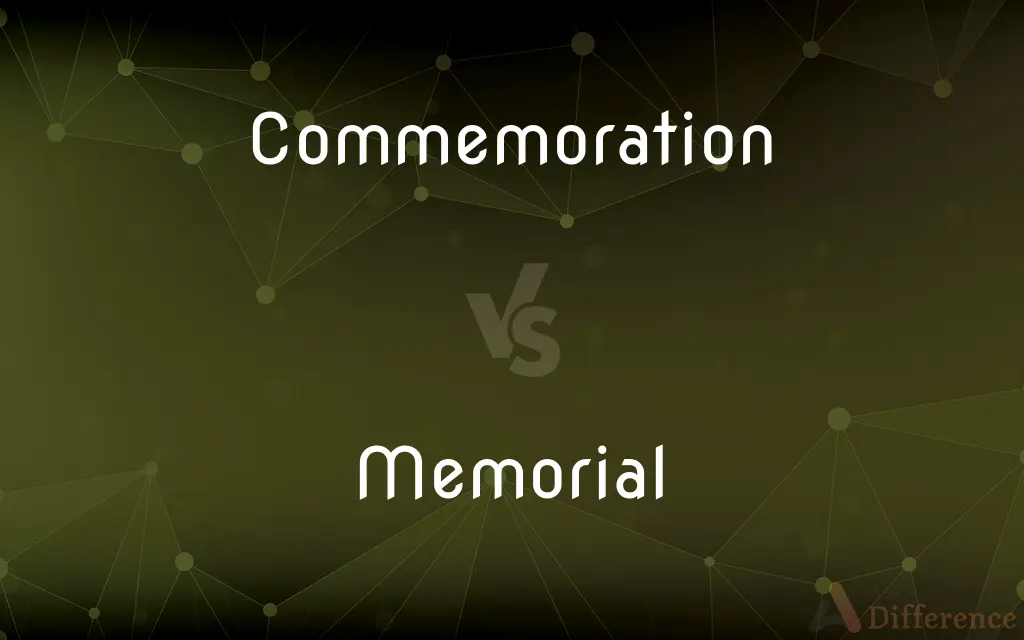Commemoration vs. Memorial — What's the Difference?
By Maham Liaqat & Urooj Arif — Updated on March 29, 2024
Commemoration is an act of remembering and honoring an event or person through ceremonies or other observances, while a memorial is a physical object or structure established to remember and honor someone or something.

Difference Between Commemoration and Memorial
Table of Contents
ADVERTISEMENT
Key Differences
Commemoration involves activities or ceremonies designed to remember and honor significant events, individuals, or groups, focusing on the act of remembrance itself. It can include a wide range of observances, from solemn ceremonies to celebratory events, emphasizing the process of collectively honoring historical moments or figures. On the other hand, a memorial is often a tangible representation of remembrance, such as monuments, plaques, or dedicated spaces, serving as a physical manifestation of collective memory and respect.
The purpose of commemoration is to reflect on historical significance, educate future generations, and foster a sense of continuity and respect for the past. It is an active process that can evolve over time, incorporating speeches, ceremonies, and educational programs. Memorials, while also serving educational and reflective purposes, act as fixed points of reflection, offering a place for individuals to come and pay their respects, meditate, or learn about the past.
While commemoration is an event or series of events that occur at specific times, such as anniversaries or designated days of remembrance, memorials provide a constant, enduring presence. This distinction highlights the difference between temporal activities and permanent structures in the practice of honoring history and memory.
The creation of a memorial can be seen as a form of commemoration, one that results in a lasting artifact intended to keep the memory of the person or event alive for future generations. However, the act of commemoration extends beyond the existence of physical monuments, encompassing a broader range of activities and expressions of remembrance.
Both commemoration and memorials play crucial roles in how societies remember and honor their past. They serve as means to acknowledge historical events, sacrifices, and achievements, ensuring that such memories remain part of the collective consciousness. While memorials provide a physical location for reflection and remembrance, commemoration involves the actions and ceremonies that actively engage people with the past.
ADVERTISEMENT
Comparison Chart
Definition
An act of remembering and honoring through ceremonies or observances.
A physical object or structure established for remembrance.
Nature
Temporal and event-based.
Physical and enduring.
Purpose
To reflect, educate, and honor historically significant events or figures.
To provide a place for reflection, remembrance, and education.
Examples
Memorial services, anniversary celebrations, dedicatory speeches.
Monuments, plaques, dedicated parks or buildings.
Focus
The process and act of remembrance.
The tangible manifestation of remembrance.
Compare with Definitions
Commemoration
The act of remembering and honoring significant events or individuals.
The city's annual commemoration of its founding includes parades and speeches.
Memorial
A structure or object established to remember and honor a person or event.
The national war memorial stands as a poignant reminder of those who served.
Commemoration
An event that marks the remembrance of a significant occurrence.
The museum launched an exhibition as part of the war's centennial commemoration.
Memorial
A monument dedicated to the memory of individuals or events.
A memorial plaque was unveiled to honor the contributions of the community leader.
Commemoration
An observance designed to memorialize historical events.
The commemoration of the battle included a moment of silence for the fallen.
Memorial
A place designated for the purpose of remembrance and reflection.
The park serves as a memorial to the city's founders.
Commemoration
A ceremony to honor the memory of someone or something.
The community held a solemn commemoration for the local hero.
Memorial
An enduring symbol of respect and memory.
The fountain was donated as a memorial to the philanthropist's humanitarian efforts.
Commemoration
Activities organized to celebrate or honor an important event or person.
Schools across the nation participate in commemoration activities on Veterans Day.
Memorial
A physical tribute to the lives and achievements of individuals or groups.
The museum features a memorial wall with the names of all the astronauts who have lost their lives in space exploration.
Commemoration
The act of honoring the memory of or serving as a memorial to someone or something.
Memorial
A memorial is an object which serves as a focus for the memory or the commemoration of something, usually an influential, deceased person or a historical, tragic event. Popular forms of memorials include landmark objects or works of art such as sculptures, statues or fountains and parks.
Commemoration
Something that honors or preserves the memory of another.
Memorial
A statue or structure established to remind people of a person or event
A memorial to General Robert E. Lee
Commemoration
The act of commemorating; an observance or celebration to honor the memory of some person or event.
Memorial
A statement of facts, especially as the basis of a petition
The Council sent a strongly worded memorial to the Chancellor of the Exchequer
Commemoration
That which serves the purpose of commemorating; a memorial.
Memorial
Something, such as a monument or holiday, intended to celebrate or honor the memory of a person or an event.
Commemoration
(religion) The specification of individual saints in the prayers for the dead.
Memorial
A written statement of facts or a petition presented to a legislative body or an executive.
Commemoration
(UK) The great festival of the Oxford academic year, usually taking place on the third Wednesday after Trinity Sunday.
Memorial
Serving as a remembrance of a person or an event; commemorative.
Commemoration
Whatever serves the purpose of commemorating; a memorial.
Memorial
Of, relating to, or being in memory.
Commemoration
A ceremony to honor the memory of someone or something
Memorial
(obsolete) Memory; recollection.
Commemoration
A recognition of meritorious service
Memorial
Something, such as a monument, by which someone or something is remembered.
Memorial
A chronicle or memoir.
Memorial
A note or memorandum.
Memorial
A service of remembrance or commemoration.
Memorial
(legal) A statement of facts set out in the form of a petition to a person in authority, a court or tribunal, a government, etc.
Memorial
Serving as a remembrance of someone or something; commemorative.
A memorial building
Memorial
Contained in the memory.
A memorial possession
Memorial
Mnemonic; assisting the memory.
Memorial
Serving to preserve remembrance; commemorative; as, a memorial building.
There high in air, memorial of my name,Fix the smooth oar, and bid me live to fame.
Memorial
Contained in memory; as, a memorial possession.
Memorial
Mnemonic; assisting the memory.
This succession of Aspirate, Soft, and Hard, may be expressed by the memorial word ASH.
Memorial
Anything intended to preserve the memory of a person or event; something which serves to keep something else in remembrance; a monument.
Churches have names; some as memorials of peace, some of wisdom, some in memory of the Trinity itself.
Memorial
A memorandum; a record.
Memorial
A written representation of facts, addressed to the government, or to some branch of it, or to a society, etc., - often accompanied with a petition.
Memorial
Memory; remembrance.
Precious is the memorial of the just.
Memorial
A species of informal state paper, much used in negotiation.
Memorial
A recognition of meritorious service
Memorial
A written statement of facts submitted in conjunction with a petition to an authority
Memorial
A structure erected to commemorate persons or events
Common Curiosities
How do communities typically engage in commemoration?
Communities engage in commemoration through ceremonies, speeches, educational programs, and other observances that honor historical events or figures.
What is the main difference between commemoration and a memorial?
Commemoration is an act of remembrance through events or observances, while a memorial is a physical structure or object dedicated to remembering and honoring.
Can a memorial be part of a commemoration?
Yes, the unveiling or visiting of a memorial can be a key element of a commemorative event.
Can commemoration change over time?
Yes, the ways in which societies commemorate can evolve, reflecting changing perspectives, historical understandings, and societal values.
What role do memorials play in society?
Memorials serve as enduring reminders of the past, helping to educate the public, preserve historical memory, and offer spaces for reflection and mourning.
Is commemoration only associated with solemn events?
Not necessarily; while many commemorations are solemn, others can celebrate achievements or milestones in a more festive manner.
How is the location of a memorial chosen?
The location is often chosen for its significance to the event or individual being commemorated, or for its accessibility to the public for reflection and remembrance.
Why are memorials created?
Memorials are created to provide a lasting symbol of remembrance and respect for individuals or events, serving as focal points for reflection and education.
How do individuals participate in commemoration?
Individuals can participate by attending ceremonies, learning about the history behind the commemoration, and engaging in reflective practices.
Why is it important to commemorate historical events?
Commemorating historical events helps ensure that important moments and figures are remembered, offers lessons for the future, and can provide closure or healing for communities.
What challenges can arise in the creation of a memorial?
Challenges can include debates over the design and location, securing funding, and ensuring the memorial accurately and respectfully represents the individuals or events being honored.
Can a memorial have multiple purposes?
Yes, besides serving as a site of remembrance, memorials can also fulfill educational roles, providing historical context and information.
Can a memorial be non-physical?
While most memorials are physical structures, the concept of a memorial can extend to non-physical forms like digital memorials or collective memory practices.
What makes an effective commemoration?
An effective commemoration respectfully honors its subject, engages participants, provides historical context, and leaves a lasting impact on its audience.
How do schools contribute to commemoration and memorialization?
Schools contribute by educating students about historical events, encouraging participation in commemorative activities, and sometimes creating their own memorials.
Share Your Discovery

Previous Comparison
Form vs. Forme
Next Comparison
Favoured vs. FavoredAuthor Spotlight
Written by
Maham LiaqatCo-written by
Urooj ArifUrooj is a skilled content writer at Ask Difference, known for her exceptional ability to simplify complex topics into engaging and informative content. With a passion for research and a flair for clear, concise writing, she consistently delivers articles that resonate with our diverse audience.














































